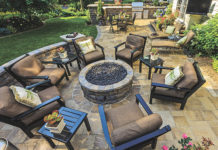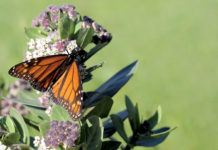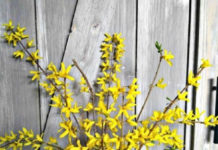By Gretchen C. Van Benthuysen
There’s nothing really new about composting. It’s been going on for centuries.
But as more Americans begin paying more attention to where their food comes from — and where their food waste is going — interest in composting is growing.
“Americans put trillions of tons of garbage into landfills,” said Quinn Lahm, manager of Brock Farms Home & Garden World, Colts Neck. “Composting disposes of stuff we were going to get rid of anyway.”
We’re talking food scraps, grass clippings, leaves, weeds (but not with seeds), flowers, coffee grounds, chopped twigs and branches, sawdust and wood ash.
We are not talking meat scraps, diseased or insect infested plants, dog or cat feces (or cat litter of any kind), food with grease or soap residue.
“The first question I get is ‘Do I need a lot of space?’ ” Lahm said. “No, is the answer.”
What you do need is water, nutrients, aeration and the correct internal temperature, she said.
“The sweet spot for the fastest decomposition is a temperature between 160 and 110 degrees (Fahrenheit),” she said.
“The thing about composting is you really have to do it the right way,” she explained. “Start with a base high in nitrogen, like grass clippings, or leaves.
“Add eggshells, banana peels, apple cores, potato peels, coffee grinds, stuff like that that provide potassium, magnesium, calcium and nitrites,” she said.
Kelsey Forsyth, garden center associate at Sickles Market, Little Silver, said it’s all about brown and green.
“Newspapers, coffee filters, tea bags are ‘brown’ and grass is ‘green,’ with the correct ratio 25-1, brown to green,” she said. “The grass, high in nitrogen, breaks things down, but too much can cause it to stink.” It may also smell if too wet.
“You need air flow. That’s why people like bins that rotate,” Lahm said. “Once a week, flip it over.” Bins that don’t rotate can sit on a pallet, she said.
Not only does composting save money, avoid landfills, reduce chemicals, reduce fertilizer and water use, it is an essential factor in organic farming, said Natale Siclare, Sickles’ lifestyle garden center manager.
He notes the garden center’s proximity to local rivers and the ocean.
“We’re very conscious of that and 95 percent of the soil amendments we sell are organic,” he said. “Some of our clients’ homes use well water and that matters to them.
“Composting is cyclical. It reduces the use of fertilizer and pesticides,” he said. “As the soil is amended, tilth and water-holding capacity improves.”
Learn More About Composting
Monmouth County residents may attend a 45-minute Backyard Composting workshop offered by the county at different locations from April through November. There is no fee to attend, but if you pay $35 the Earth Machine composter is included. Go to visitmonmouth.com for more information.
Compost Deconstruction Areas are open throughout the state displaying various types of compost bins. Locally there is one at Deep Cut Park in Middletown. Call 732-842-4000 for hours and scheduled tours or workshops.
For more information or to troubleshoot problems with your compost, visit the Rutgers New Jersey Agriculture Experiment Station website at njaes.rutgers.edu.














